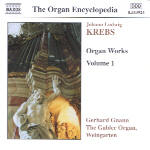Johann Ludwig Krebs was one of Bach’s best students, going on to hold several prestigious musical posts, including organist in Altenberg at the court of Prince Friedrich. His compositional style owes much to his teacher; his works are quite enjoyable and make for a good adventure off the usual listening path. The Toccata in E, which kicks this CD off, has a very arresting opening passage for solo pedals which builds to a blazing climax, this followed by an intricate fugue of great interest. The Toccata in A minor is almost the reverse of the other, the opening featuring a flashy, virtuoso display in the manuals over a sustained pedal note, though later the pedals take the florid melody. The chorale preludes are diverse in construction and quite interesting, and the trio is singularly charming. Soloist Gerhard Gnann has a good feeling for the music, chooses colorful and appropriate registrations, and plays with flair, finesse, and rock-steady rhythm. The recorded sound is also quite fine; so all things considered, we can be happy this CD is listed as a “Volume 1.”
































